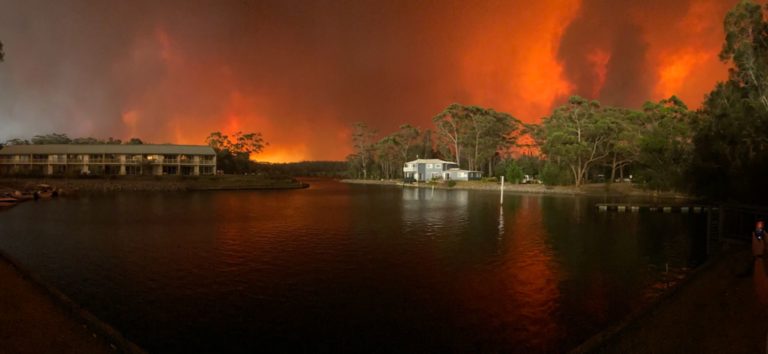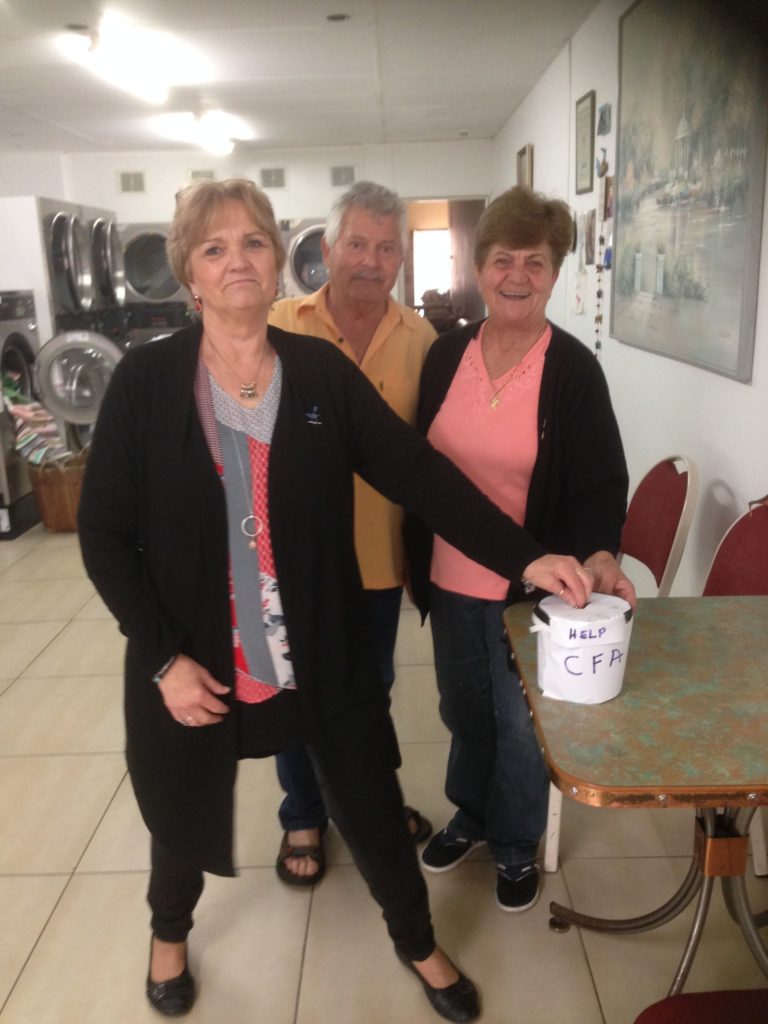Australia is experiencing a devastating period in the nation’s history. Bushfires have been burning for several weeks now, thousands of residents and visitors have had to flee to safety, and volunteer firefighters have been working tirelessly to protect civilians and animals. While there has been some respite with cooler temperatures, warnings have already been put out, with conditions expected to worsen in coming days.
We spoke with Greek Australians who have found themselves among the chaos.
“It’s going to be an ongoing issue for Australia”
It wasn’t exactly the start to the new year that Michelle Pini was expecting.
The Greek Australian was on holiday with her husband in Tomakin, a town on the south coast of New South Wales, when she woke up on New Year’s Eve to thick smoke, and a burnt orange sunrise.
Living in a high fire risk suburb in Victoria, the pair had their RFS app updating them during their stay. But when they saw the red glow of fire looming from the Tomakin Beach lookout, they decided it was best they leave. They returned to the resort to pack their clothes, with the intention of returning the next day, once the threat had passed. That would not be the case.
“We went to Moruya and we sort of hung around most of the day waiting to be allowed back in [to Tomakin], but there was a road block,” Michelle recalls. “Nothing was open; no petrol, virtually no food, no water.”
With no other option, the couple made their way to the relief centre at the local showgrounds. There were some resources, but very few, still no power and no petrol. Even if they could get out, how far would they get?
That evening, as others around the country were celebrating the coming of a new decade, Michelle and her husband, along with hundreds of others, were being briefed by the RFS, which she describes as “sombre to say the least”.
“Basically they told us at the moment we were surrounded by fire, there was no way we could leave really and they were more concerned about loss of life than they were about properties, and everybody just quietly went to bed. It was New Year’s Eve, there was no talk of the new year, there were no festivities, everybody was virtually asleep by about 9.30 pm, or they were quiet anyway.”
They spent the night at the showgrounds, where they slept in the car. In the morning they planned on returning to the resort to collect the rest of their things, but that wouldn’t be possible.
“We asked ‘when can we go back?’ and they said ‘well it’s burnt’. We didn’t know if the resort was burnt or not, but they said a lot of Tomakin was gone,” recounts Michelle.
Thankfully once the road was opened, they found the resort standing. Inside were people who had been on lock down, having left it too late to leave. Some had managed to capture the nightmare on camera, Michelle able to see how close the fire had come, having virtually burnt all the surrounds of the resort.
With roads to both the south and west closed, the couple knew their only way out was to head north. They made their way to the Tomakin evacuation point, where they waited until the road to Bateman’s Bay was opened, albeit for a short window.
There they witnessed scenes of chaos.
READ MORE: Insurance companies will cover the costs to clients affected by bushfires

“There were already absolutely absurd queues for petrol, there was only one supermarket open … people were coming out with full trolleys with water and other items,” Michelle says. “Eventually we managed to get petrol. It was cash only because that place had a generator, no one had power still, so there were no ATMs and that meant the people that were out of cash or on welfare cards, I don’t know how they got out.”
From there the couple drove north to Ulladulla, where the power was finally coming back on. But the severity of the situation struck once more when they walked into the one supermarket that was open.
“All the fresh food was gone, all the water was gone, it looked like locusts had been there. It was practically stripped. We got whatever we could, which was really just health bars. We checked into the relief centre at Ulladulla, but we decided not to use facilities because there were people there with kids and older people. So we decided we would sleep in our car again because we couldn’t go any further north,” she says.
At 8.00 pm they were informed no roads would be open for at least another 24 hours. Thankfully, that would not be the case.
“For some reason, I’m not a religious person, but I do believe in God and a wider connectivity, I woke at 4.00 am for no good reason, and I said to my husband ‘we’ve got to go now’. So we went and sat in the queue, in the roadblock, which was miles and miles long, and at 6.30 am they opened it and we got out,” she says.
At this stage they were 200 kms away from Sydney, a significant detour in coming back to Melbourne, but Michelle says “we would have gone anywhere really just to get home”.
While relieved to be back home and safe, Michelle admits she felt quite despondent upon her return. With fires still burning in NSW and Victoria, and conditions expected to worsen with the rising temperatures, she says she is aware that this is just the beginning.
“These fires are unprecedented as everyone keeps telling us. But normally February is the time, and we’re already there. And the ramifications are not only the deaths and the homes lost, farms and livelihoods, and the wildlife, which are already devastating, but it’s all the long-term ramifications,” Michelle says.
“How are people going to rebuild their businesses? They’ve lost that business now, there’s no way they will be able to get that money back even if they do rebuild. How are the insurance companies going to be able to make all these payouts? I’m sure a lot of them will go under. Then there’s going to be shortages with food, with fresh water, there are already towns where they’re out of water.”
While Michelle had only praise for the emergency services personnel, from what she witnessed first-hand, she says the support necessary from a governmental level was visibly absent.
“There was no way that the military were there, except in some administrative capacity, because nobody that I spoke to or saw, ever saw the military there. They’ve been saying they’ve been there since November – that was a complete misrepresentation of the facts as far as I’m concerned. If the military was there, there would have been food drops, there would have been generators, there would have been water supply, and there would have been proper road blocks instead of poor council workers working around the clock and being abused by people that went crazy from fear. Some people were threatening to kill the council workers because they weren’t allowed to go through the road block,” she reveals.
“There’s no way that they were prepared in any way shape or form, even though the temps have been raising since November. No amount of donations is going to solve that. I think it’s going to be an ongoing issue for Australia.”
READ MORE: Greek Australians living abroad feel the agony of the fires
“Not a bird is heard and there are no people”
Among those who have witnessed the impacts first-hand in Victoria are Greek Australians Philip and Antonia Krikelis.
They were among those advised to evacuate their Lakes Entrance home on New Year’s Eve, finding temporary shelter in their laundromat in Bairnsdale.
“Things were getting dangerous and they were asking people to leave the area. Every half hour my mobile was ringing with alerts from emergency services,” their daughter Roula told Neos Kosmos.
When the roads were briefly reopened between Bairnsdale and Lakes Entrance, Philip and Antonia returned to check on their home, which was fortunately unharmed, but what they saw around them was devastating.
“It looked like it was raining but it is the ash that is visible through the windows,” Roula explains, who has since returned to Melbourne.
“They told me they couldn’t see outside, and the air quality was poor.
“I was calling them every day because I was worried.”
The couple have become a saving saving grace for hundreds of residents and visitors who were also advised to flee surrounding areas. They have opened the doors to their laundromat, which has become a ‘oasis’, helping to meet people’s basic needs as many experience water and electricity outages.
“A lot of homes have been lost, and a lot of our customers don’t have electricity or water,” Philip told Neos Kosmos. “We’re a small community and everyone helps each other.”While there was some rain earlier in the week as temperatures dipped, Philip said it was unfortunately “so light that it helps nothing”, with the atmosphere remaining cloudy with smoke.
“We are all very down about it, and trying to help in any way we can,” said Antonia, who together with her husband started a fundraiser for donations to the CFA.
“They tell me ‘it’s very sad here, not a bird is heard and there are no people. It’s completely dead’,” recounts Roula, who is concerned about her parents staying in Bairnsdale, but understands they are committed to stay put.
“‘We don’t want to leave,’ they tell me, ‘because our community needs us to have the shop open […] others stay in the parking lot, at the racecourse, and don’t have anything. We can’t close,’ they say, ‘because we’re part of the community and we want to support them’.”
READ MORE: Trauma recovery expert points to psychological impact of the bushfires
